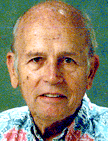


ON page 76 of his autobiography, Matsuo Takabuki refers to a fellow World War II 442nd Regimental Combat Team veteran even better known than he is: Matsuo Takabuki tells
his success story"Dan Inouye has always been in a class by himself. Extremely charismatic, with a wonderful sonorous speaking voice."
On the next page Takabuki notes: "I would say 'no' to constituents' wishes and they would be mad as hell at me. Others could say 'no' and their constituents would not be personally mad at them." He recalls being told he had "negative charisma" -- yet he went on to be almost as pioneering in the financial world as Inouye was in the political one.
In World War II they were young Americans of Japanese ancestry fighting in the foxholes of Europe to prove their loyalty to America. Neither could possibly have dreamed how far they would go to win a place at tables of power.
Prewar Hawaii had a solid glass ceiling over its Asian residents. Inouye and Takabuki led a charge through these ceilings to influence no kamaaina haole resident of Hawaii ever achieved.
Inouye has long been one of the most powerful voices in the U.S. Senate. Takabuki became a financial deal-maker successful from Wall Street to Tokyo, Hong Kong and Beijing in part because of cross-cultural understandings developed in Hawaii.
Takabuki's collaborators in writing his autobiography say in their introduction that he was sometimes seen as "blunt if not slightly arrogant" even though the more important fact was that here was a man "wholly confident in his accomplishments without the need to boast or defend his past actions."
It was Professor Dennis M. Ogawa of the University of Hawaii who arm-twisted Takabuki to sit down for extensive interviews and allow his story to be told under the title: "An Unlikely Revolutionary -- Matsuo Takabuki and the Making of Modern Hawaii."
Issued a few months ago by the University of Hawaii Press, it helps fill a major gap in the history of Hawaii's AJAs. It also should be an inspiration to any young person of any race, male or female, who believes society's established obstacles are too formidable to overcome.
History often is best learned through biographies -- how real-life people dealt with real-life situations. Autobiographies run the risk of bias, but who says biographers are without bias? Either way, we get insights that bland recountings of history don't give us, and can make our own judgments.
Takabuki was from a Haleiwa family and pre-war looked to being a teacher as the highest goal an AJA could attain in Hawaii.
With the GI Bill he became a lawyer educated at the University of Chicago and soon became aligned with another charismatic person, businessman Chinn Ho, and Ho's Wall Street adviser, Sam Silverman. With them he learned the ropes of Wall Street finance and how to structure complicated deals to satisfy diverse participants who might have quite different needs and interests.
He later took this savvy with him when he became a trustee of the Kamehameha Schools/Bishop Estate and led it to become a 10 percent owner of Goldman Sachs, Wall Street's financial powerhouse. This led also to dealings in Asia, where he learned he was really Western despite his Japanese face but could be a good in-between person.
TWO years before the 1954 "Democratic Revolution" that took over the Legislature and launched Inouye into elective politics, Takabuki was elected to the Honolulu Board of Supervisors, later City Council. He served 18 years but never was comfortable with the demands of public office.
He defends earning money while in politics so long as you do not abuse your office. He also blesses co-investments, as with Bishop Estate, as willingness to share the risk. He puts the media somewhere below used car salesmen in his hierarchy of respect.
When he was appointed a Bishop Estate trustee, the bells at Kawaiahao Church were tolled to show Hawaiian opposition to the selection of an AJA. When he retired, more than 21 years later, they were tolled to honor his service.
Bishop Estate Archive
A.A. Smyser is the contributing editor
and former editor of the the Star-Bulletin
His column runs Tuesday and Thursday.